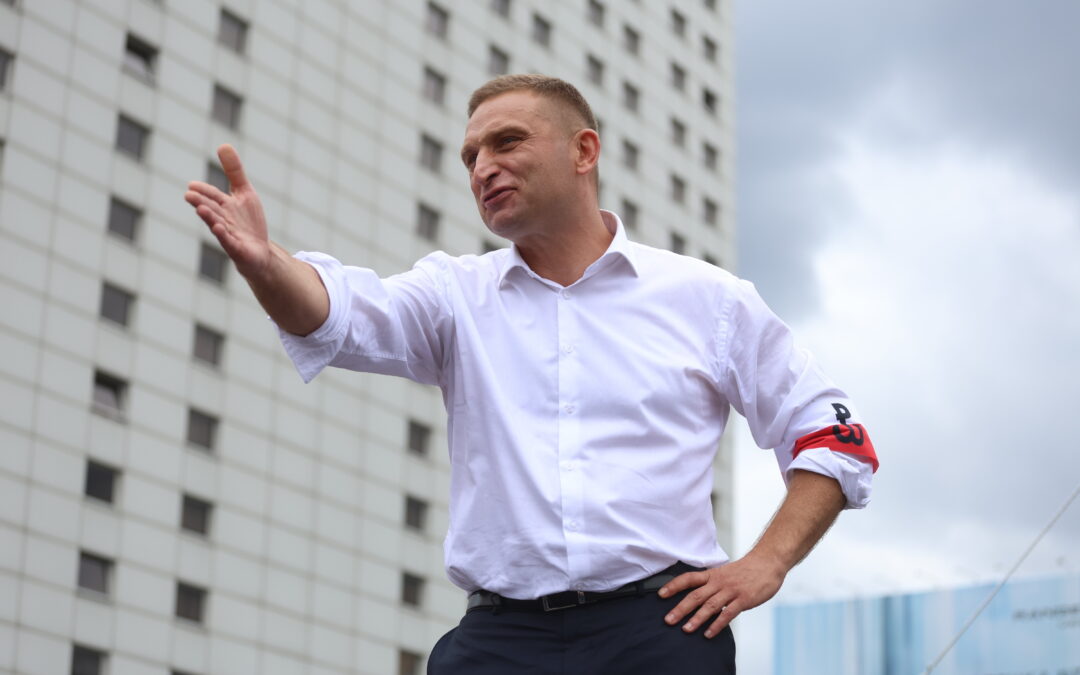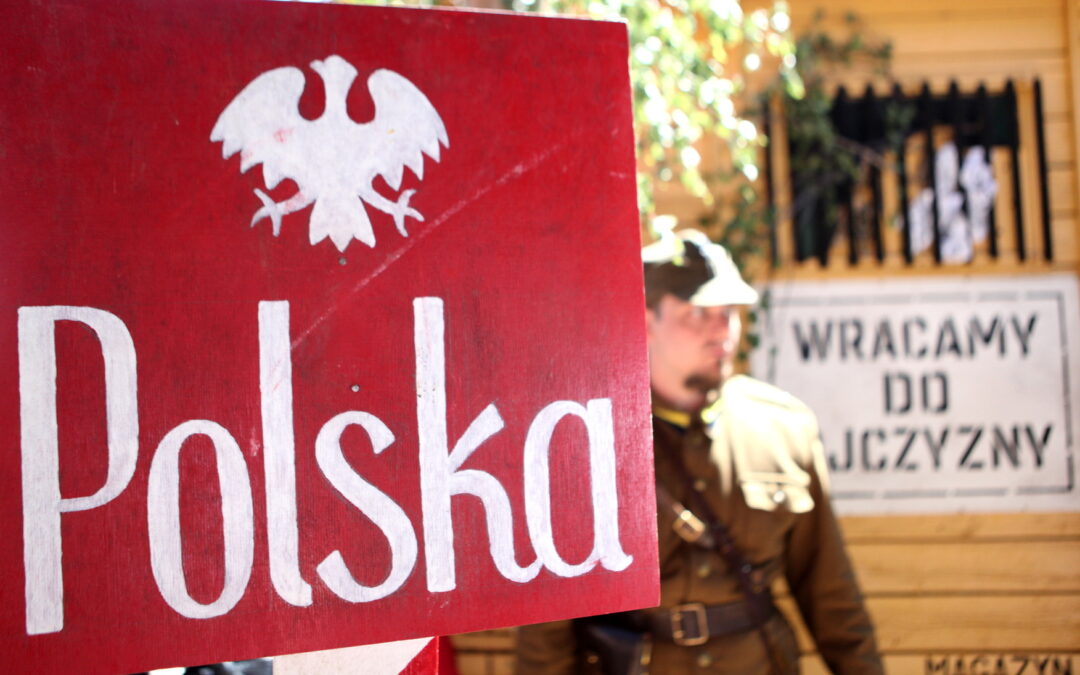By Aleks Szczarbiak
Barring a political earthquake, Poland’s right-wing prime minister is unlikely to be dismissed before next spring as there is no obvious alternative and replacing him could destabilise the governing coalition.
Nonetheless, his political future hangs in the balance, and whether he leads the government into next autumn’s parliamentary election depends on how he copes with the huge economic and energy security challenges facing the country this winter.
Reassuring business elites and Brussels
Recent months have seen speculation that the right-wing Law and Justice (PiS), Poland’s governing party since autumn 2015, may replace Prime Minister Mateusz Morawiecki.
When he took over from incumbent Beata Szydło at the end of 2017 it was felt that Morawiecki would, as a respected former international banker, reassure business elites concerned about PiS’s costly redistributive social welfare programmes and commitment to state intervention in what it considered to be key strategic sectors of the economy.
In addition to his apparent economic moderation and competence, it was also hoped that Morawiecki’s supposed greater credibility in diplomatic circles would help to improve Poland’s international standing, and specifically “reset” PiS’s problematic relations with the EU political establishment.
From the outset, the PiS government has found itself in conflict with the European Commission over so-called “rule-of-law” issues, especially its controversial judicial reforms. Morawiecki tried to decouple this dispute from Warsaw’s ability to develop pragmatic working relations with the EU institutions and major European powers.
Following PiS’s reelection in autumn 2019, Morawiecki emerged as a key figure in the governing camp’s “modernising-technocratic” wing. This has at times been very critical of Poland’s post-1989 establishment but also believes that PiS has to find more effective ways to reach out to better-off, well-educated voters in urban areas by focusing on socioeconomic transformation rather than ideological issues.
Morawiecki originally appeared to enjoy the backing of PiS leader Jarosław Kaczyński who, although he does not currently hold any formal state positions, exercises a powerful behind-the-scenes influence in determining the governing camp’s programmatic and strategic priorities.
Kaczyński seemed to believe that, in order to make progress with its radical state reconstruction project, PiS had to win public support by demonstrating its competence in socioeconomic policy and international relations, and that Morawiecki was best placed to achieve this. Indeed, at one point there was even speculation that he was considering Morawiecki as a possible successor as party leader.
Under-delivery and domestic problems
However, because of his background as a wealthy technocrat, Morawiecki was always seen as something of an outsider in a party whose electoral base was concentrated among less well-off voters in rural and small-town Poland.
For sure, Morawiecki attempted to develop a more demotic style to appeal to PiS’s core electorate, but he was not entirely convincing in this new persona and never really won over the hearts and minds of the party faithful. Moreover, rather than reaching out to new political constituencies, PiS’s base of support actually became more consolidated in its electoral heartlands.
Morawiecki’s greater familiarity with diplomatic niceties certainly enabled him to develop better contacts with Western politicians than his predecessor. In December 2020, Morawiecki strengthened his reputation as an effective negotiator and dealmaker when he concluded the 2021-27 EU budget round with Poland once again set to be the largest net recipient of regional funds.
However, he was unable to end the ongoing “rule-of-law” dispute, as a consequence of which the European Commission is continuing to withhold Poland’s €35 billion share of the EU’s post-pandemic coronavirus recovery funds.
Brussels argues that the Polish government has not fully complied with its “milestones” for amending PiS’s contested judicial reforms; Warsaw vigorously denies this and says that the commission is exceeding its powers.
Indeed, there are now also concerns over whether Warsaw will receive payments from the €75 billion that it is expecting in the new round of EU regional funds. Morawiecki’s eurosceptic critics within the governing camp argue that, during the EU budget negotiations, he made a critical error in agreeing to the principle of linking payment of EU funds to “rule-of-law” conditionality.
His defenders argue that Poland only agreed to conditionality applying in cases where a direct and specific causal link could be established between breaches of rules and negative consequences for the EU’s financial interests.
At the same time, domestically Morawiecki’s government is having to grapple with an economic slowdown, high energy prices, potential winter fuel shortages, surging inflation (now nearly 18%) and falling living standards.
Inflation accelerated again in Poland in October to reach 17.9%, the highest level since December 1996.
Energy prices increased by 41.7% year on year while food and non-alcoholic beverages rose by 21.9% pic.twitter.com/ytYi4eNqkd
— Notes from Poland 🇵🇱 (@notesfrompoland) October 31, 2022
As a consequence, after a brief rebound following Russia’s invasion of Ukraine in February, since the summer opinion polls have shown support for PiS declining. According to the “Pooling the Poles” micro-blog, which aggregates voting intention surveys, although PiS remains Poland’s largest party, averaging 35% support, this is well short of the 40% that would allow it to secure an outright parliamentary majority.
An October survey for the CBOS polling agency also found that only 26% of respondents declared themselves supporters of Morawiecki’s government while 47% were opposed, its worst rating since the party came to office.
Morawiecki’s rivals emboldened
Morawiecki’s problem is that he lacks a power base in the governing camp’s factional politics and has significant government rivals who have become increasingly active and emboldened as they felt his position becoming weaker.
One of his most significant opponents has been justice minister Zbigniew Ziobro, who leads the right-wing United Poland (Solidarna Polska) grouping, PiS’s junior governing partner, and has introduced many of the government’s most controversial policies, notably its judicial reforms.
Ziobro represents what might be termed the “traditionalist-revolutionary” faction within the governing camp that remains committed to pushing ahead with radical state reconstruction and promoting a conservative vision of national identity and traditional values.
However, divisions within the governing camp also run through PiS itself, some of whose “old guard” are in many ways ideologically closer to Ziobro and have always been wary of Morawiecki’s ambitions.
Within the government, during the summer opposition to Morawiecki coalesced around deputy prime minister and state assets minister Jacek Sasin, who led a plot to have him replaced.
Relations between the two politicians have been tense since Sasin felt that Mazowiecki tried to blame him for an abortive and costly attempt to organise a postal ballot for the May 2020 presidential election following the introduction of coronavirus pandemic restrictions.
Recently, they became embroiled in a bitter dispute over questions of competency and personnel decisions following the outbreak of the energy crisis arising from the war in Ukraine.
Morawiecki’s critics also suggested that, at a time of economic crisis, the government needed a less technocratic and more “caring” figurehead, and floated Elżbieta Witek – the speaker of the Sejm, Poland’s more powerful lower parliamentary chamber – as a possible replacement.
At the same time, Kaczyński has started to become somewhat disillusioned with the prime minister. Earlier this year, Morawiecki was the politician most associated with the government’s flagship “Polish Deal” (Polski Ład) socioeconomic reform programme, which he promoted as a political gamechanger that would take PiS through to victory at the next parliamentary election, scheduled for autumn 2023.
However, Morawiecki’s reputation for economic competence suffered a major blow as the confusing rollout of the tax reforms that comprised a key element of the programme turned into a public relations disaster for the government.
Moreover, given that one of the key reasons for Mr Morawiecki’s initial appointment was his apparent ability to reach agreement with the EU elites, Kaczyński was particularly disappointed that the commission was continuing to block the release of Poland’s share of the coronavirus recovery funds.
Morawiecki survives, but loses key allies
However, last month talk of replacing Morawiecki subsided, not least because Kaczyński realised that ongoing criticisms of the prime minister were damaging the governing camp as a whole and removing him could be very problematic.
Changing the prime minister requires a parliamentary vote of confidence in his proposed replacement which could be extremely destabilising for PiS if every component of the governing camp started to introduce new conditions for their support.
Moreover, Morawiecki’s opponents lacked any credible alternatives, both in policy terms (many of the governing camp’s internal conflicts are about securing influence within the Polish state rather than substantive political differences) and an obvious replacement for him.
There was speculation at one point that Morawiecki could be replaced by deputy prime minister and defence minister Mariusz Błaszczak, a very solid if rather colourless favourite of Kaczynski’s, or Szydło, now a member of the European Parliament who remains a favourite with the party grassroots. Perhaps not surprisingly, neither of them currently appears interested in the job.
There may be a certain political marketing logic to replacing Morawiecki with a potentially more empathetic figure such as Witek. However, although his reputation for administrative competence has taken a considerable knock in recent months, Morawiecki retains an edge over other PiS leaders in terms of his understanding of the workings of the economy, which is seen as a key quality required to get the government through the challenges of the next few months.
Nonetheless, the price that Morawiecki had to pay for remaining in post was the dismissal of some of his closest collaborators.
At the end of September, Michał Dworczyk resigned after five years as head of the prime minister’s chancellery. Although he cited personal reasons, for months the Polish media has been publishing Dworczyk’s private email correspondence revealing embarrassing details of the governing camp’s behind-the-scenes operations (PiS disputed its authenticity and argued that the hackers had Russian connections).
He was replaced by former Sejm speaker Marek Kuchciński, one of Kaczynski’s most trusted political allies who will no doubt act as the PiS leader’s “eyes and ears” in the prime minister’s office.
The PM's chief of staff, who was also a government minister, has resigned.
He cited "personal reasons" but has also faced pressure over leaked emails hacked from his account and was reportedly a target for the PM's opponents within the ruling coalition https://t.co/k7BRdhAvCK
— Notes from Poland 🇵🇱 (@notesfrompoland) September 30, 2022
This was quickly followed by the dismissal of European affairs minister Konrad Szymański, another politician felt to be part of Morawiecki’s entourage and who many of the prime minister’s critics hold responsible for the failure of the government’s negotiations with Brussels over EU funding. The departure of these two ministers was widely interpreted as a significant weakening of Morawiecki’s authority and grip on the levers of power.
Next spring is crunch time
Kaczyński also appears to have left open the possibility of replacing Morawiecki at some point ahead of the parliamentary election. The obvious time for a change of prime minister would be next spring so, barring a political earthquake, Morawiecki is unlikely to face another serious challenge until then.
Beyond that, his fate really depends on how the government deals with the huge economic and energy security challenges that it faces during the next few months. If Morawiecki can take credit for getting the government through this difficult period without major energy supply shortages, Poles feel that their living standards have not declined too dramatically, and a pathway opens up for PiS to retain power at the next election, then he is likely to survive.
If, on the other hand, living standards continue to fall and the energy security situation deteriorates, his days could be numbered. Even then, a change of prime minister would be politically risky, as it would mean PiS admitting to having made mistakes and still require securing a parliamentary vote of confidence in his successor.
But it would also offer an opportunity to draw a line under the past, with Morawiecki taking the blame for the government’s various failings and his successor portrayed as representing a new political opening in the run-up to the autumn election.
Main image credit: KPRM (under CC BY-NC-ND 3.0 PL)





















